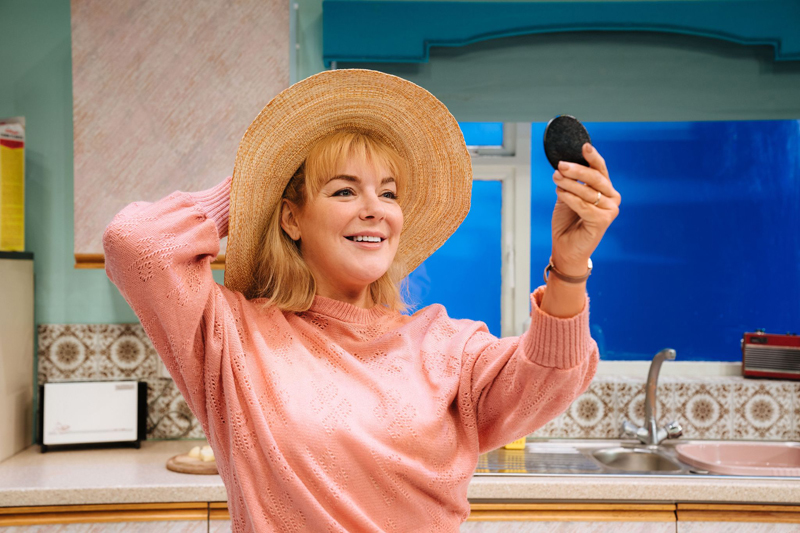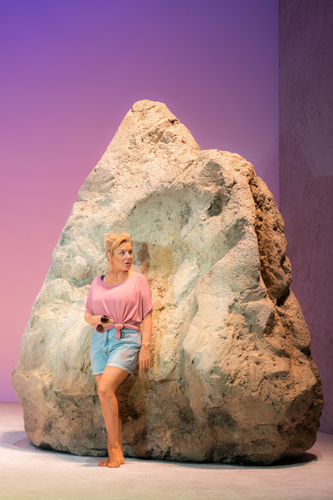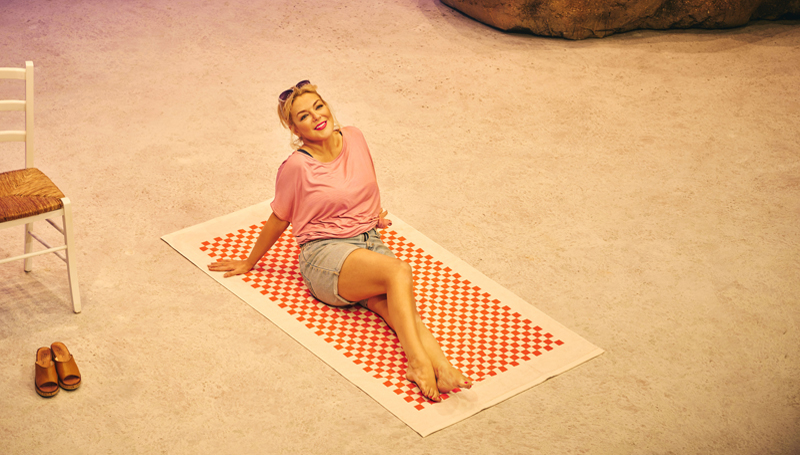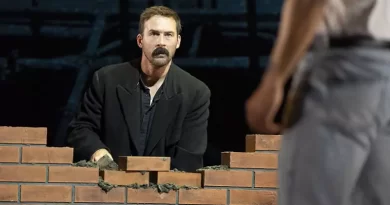“Shirley Valentine” at Duke of York’s Theatre
Neil Dowden in the West End
3 March 2023
Willy Russell’s 1986 monodrama Shirley Valentine may seem a bit dated in some respects now, but it is a gift of a role for a performer like Sheridan Smith who effortlessly keeps the audience engaged for two hours. She plays the titular middle-aged, working-class housewife from Liverpool who longs to break free from the stultifying routine of her life after years of serving her family – with a two-week break in Greece offering an escape in what is ultimately a feel-good dramedy of self-affirmation.

Photo credit: Helen Murray.
In the first half, we see Shirley in her kitchen apparently out of loneliness talking to “wall” but with Smith actually breaking the fourth wall in her direct address to us. As she drinks white wine while cooking the habitual meal of “chips and egg” for her emotionally distant husband Joe – who will expect it to be served promptly at 6 p.m. when he gets home from work – she reflects on how her life has stagnated, with her self-absorbed grown-up children having left the nest. After much hesitation, she decides to take up her divorced friend’s offer of a free fortnight’s trip to a Greek island – where we see her in the second half, basking in the seaside sun and romancing with local waiter Costas.
The ideas of life seeming almost over at 42 and finding self-fulfilment in a Mediterranean holiday seem rather absurd now, but there is real pathos as well as comedy in Shirley’s description of her predicament. She has faded from being a lively young woman with dreams of travelling to a frustrated stay-at-home – even if her playful sense of humour survives intact. And Russell suggests a real feeling of release when she finally ventures abroad, apparently for the first time, in a transformative act of self-confidence.
Matthew Dunster’s enjoyable production rightly doesn’t try to update the play – that wouldn’t work as it is definitely of its time. Paul Wills’s design contrasts – either side of the interval – the domesticity of a well-cleaned, mint-green-walled kitchen and upper-storey relief with sand, large rock, and expansive blue/pink backdrop suffused by Lucy Carter’s sun-drenched lighting.

Photo credit: Helen Murray.
The actor playing Shirley not only has to enlist our sympathies, but also to conjure up a number of other characters – both of which Smith does wonderfully well, hinting at some vulnerability behind the comic patter. Vocally and physically, she skilfully brings to life the phlegmatic, repressive Joe, her arty son – a self-styled urban poet who lives in a squat – and her demanding daughter, who unexpectedly returns home after falling out with her flatmate. With a light touch, she also evokes her belittling headmistress, her school friend turned high-class hooker, a snooty neighbour, moaning Brits abroad, and the smooth operator Costas, amongst others.
Above all, Smith gets us rooting for Shirley. Indeed, when she talks about how men’s behaviour changes after the “first horizontal” one female audience member guffaws so much that the action pauses for a minute. And when the curtain rises showing Shirley on the beach in Greece there is a cheer from some in the audience. With a convincing Scouse accent and a natural, easy-going manner that implies she is confiding in us, Smith draws big laughs even when some of the jokes may now seem pretty lame: “Marriage is like the Middle East … There’s no solution” and “sex is like Sainsbury’s, y’know, overrated … Just a lot of pushin’ an’ shovin’ an’ y’still come out with very little at the end”.
It’s an assured performance from the double Olivier Award-winning Smith who is equally at home in musical theatre or straight plays, TV sitcoms or dramas. Many will be surprised that Shirley Valentine is a one-person show if they associate the part with Pauline Collins, who starred in the successful 1989 film with a supporting cast, but she also played the role in the West End and on Broadway, while more recently Meera Syal and Jodie Prenger have also given their singular interpretations. Russell was on a hot streak in the eighties, with the play netting him his third Olivier following Educating Rita and the musical Blood Brothers – all of which feature strong, sympathetic women at their centre.









